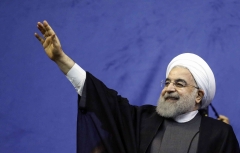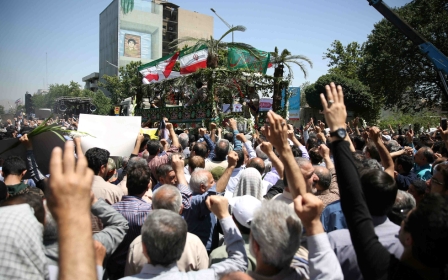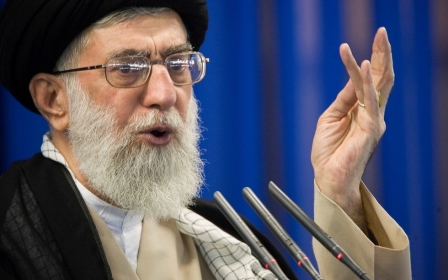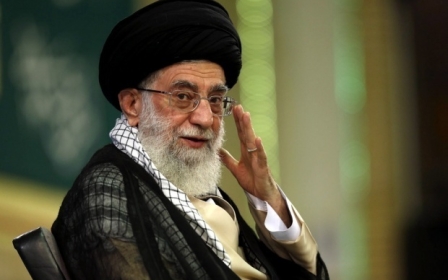Iran Supreme Leader Khamenei's war against President Rouhani
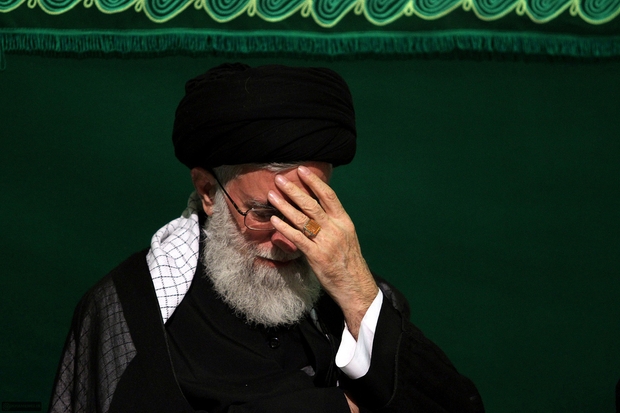
On 5 June, Iranians were shocked when Islamic State (IS) gunmen stormed the parliament and the mausoleum of the leader of Iran's revolution, Ayatollah Ruhollah Khomeini, in Tehran.
CCTV footage showed terrified men and women running for cover as terrorists shot at them. IS published a video purporting to show its men inside the parliament.
Amid the fervour, Iran's Supreme Leader Ayatollah Ali Khamenei held a three-hour meeting with representatives of Islamic associations of students from universities across the country. It was astonishing that he spent less than a minute discussing the attack, calling it a "firecracker," and he did not even bother to express his condolences to the victims' families. "They [the terrorists] are too trivial to affect the nation's will. God willing they will be uprooted," he said. That was almost the full extent of his remarks on the matter.
Domestic politics
As the world waited for the ayatollah's reaction to IS's first attack on Iranian soil, he turned instead to Iran's domestic politics. The speech demonstrated the extent to which factional infighting in Iran has taken priority over even issues of significant magnitude.
Before getting to the core of his speech, Khamenei first explained how identity politics has driven, and is driving, the revolution. He said "Iran and Iranian identity" were causing a sort of indigestion in the global system, and reiterated: "The identity of the Iranian nation and the plentiful causes of this nation naturally pitted the [global] hegemonic order against the Islamic Revolution and an intensive campaign began between the Islamic establishment and the powers and influential global movements."
He concluded that, as a result, everything comes down to a "cultural battle" between the revolution and the hegemonic order.
To clarify who he was addressing, he pointed to some associations aiming to counter the religious and revolutionary bodies in universities, and said: "These associations are not my addressees in this meeting, but we are addressing those associations that believe in the revolution and the Islamic establishment and combating their enemies."
He then turned his focus to the 2030 Agenda for Sustainable Development (referred to in Iran as the "2030 document"), a non-binding UNESCO guideline that targets education standards.
He had raised the issue during the election campaign as part of his campaign to weaken President Hassan Rouhani in favour of the conservatives' favourite candidate, Ebrahim Raisi. At the time, he accused the administration of signing the agenda and beginning "to carry it out secretly".
It is believed that Khamenei's fierce opposition to the 2030 document stems from its emphasis on gender equality. In a speech in March, the Khomenei said: "Today, Western thinkers and those who pursue issues such as gender equality regret the corruption that it has brought about."
Gender discrimination
During his election campaign this year, Rouhani repeatedly attacked gender discrimination and, in defence of the 2030 document, said that "they [his conservative opponents] send false reports to the leader". He added that the "administration will execute the document in accordance with the Iranian and Islamic culture".
Khamenei responded to Rouhani's statement in his 5 June speech, saying: "[To] those who are under the impression that we haven't received correct reports [about the 2030 document], [I say] no, the reports are correct reports."
He added: "Some say we have taken reservations and stated that we do not accept a so-and-so section [of the document], whereas I argue that our education system should not be drawn up outside the country even if no clear case in contravention of Islam had existed in it. However, there are instances in contravention of Islam in the document."
The supreme leader then emphasised to the Islamic students the need for an idealistic outlook in addition to a critical outlook.
He encouraged the students to "have serious demands regarding ideals and values". He asked them to call into question "the lapses and shortcomings" and recommended that they "by no means lose hope and grow frustrated at occasional failures".
He asked the conservative students to play an "active role" in national life and not act as mere "bystanders".
In a statement that clearly undermines the diplomatic apparatus, Khamenei stressed that "university student bodies are free to confront the external enemy. Some considerations concerning diplomatic issues rest with diplomats, but students should loudly and clearly declare their stances regarding foreign issues [emphasis added]".
The highlight of his speech began over the pretext of the ban of a Ramadan prayer sung by Iran's renowned classical singer, Mohammad Reza Shajarian. Shajarian's performance of Rabbana, a Ramadan fixture, was banned from state-run TV by the hardliners after airing for three decades.
The ban occurred after the singer sympathised with those who protested against the 2009 presidential election, which led to the re-election of the eccentric Mahmoud Ahmadinejad.
On 27 May, Rouhani posted Shajarian's Rabbana on his Instagram page, saying that it could not be eliminated. In a speech during his election campaign in May, Rouhani asked: "How can we think of elevating science and culture when we refuse to air a Ramadan prayer and Rabbana that people enjoy?"
That clearly crossed a red line drawn by Khamenei, who maintains that his "yardstick [for differentiating friends from foes] is refraining from supporting those who spearheaded the sedition". The term "sedition" is used by conservatives to describe the protests and uprisings of 2009.
In his 5 June speech, Khamenei raised the issue and said: "Sometimes, the central institutions of intellectuality, culture and politics suffer disruptions and shutdowns. For instance, you suddenly see that an argument is raised whether that song ... should be broadcast or not. This becomes a primary issue. ... It is clear that that apparatus is suffering disruption. Then they magnify the issue. ... When the central apparatus is disrupted, it is time that the officers of the Soft War [alluding to the revolutionaries with no official posts] make decisions and take action in a fire-at-will forma by realising their responsibility [emphasis added]."
Commander-in-chief
Simply put, Khamenei, as the commander-in-chief, grants authority to those who are under his command to take action against Rouhani and his administration at will.
A website reflecting the conservatives' views sought the answer to the question of why the leader used the term "fire-at-will forma" in his speech. It then offered a number of reasons, among them the following: conventional confrontations no longer work and a jihadi move is thus necessary; the enemy is close by; the enemy has disrupted the recognition system of many officials; the commander-in-chief trusts his young officers; the window of opportunity is closing, and the young revolutionaries are ahead of the non-revolutionary elite.
It remains to be seen how this declaration of an irregular, potentially chaotic political war will evolve in the coming months. But there is no doubt that the project of bringing down or neutralising Rouhani is, to say the least, already underway.
- Abraham Nematzadeh is a political analyst focused on Iran.
The views expressed in this article belong to the author and do not necessarily reflect the editorial policy of Middle East Eye.
New MEE newsletter: Jerusalem Dispatch
Sign up to get the latest insights and analysis on Israel-Palestine, alongside Turkey Unpacked and other MEE newsletters
Middle East Eye delivers independent and unrivalled coverage and analysis of the Middle East, North Africa and beyond. To learn more about republishing this content and the associated fees, please fill out this form. More about MEE can be found here.



